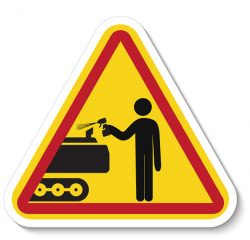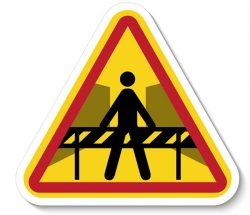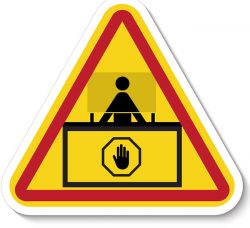
No-contact rentals: New rules for the present and the future
By Andrew Snook
Features Business Intelligence Government and regulatory 2020 canada COVID-19 june no contact rentalBusiness at a distance may become the new normal.
 Even in the contactless rental store, some contact happens. That’s where the hand sanitizer comes in.
Even in the contactless rental store, some contact happens. That’s where the hand sanitizer comes in.
Every so often in history, a momentous event takes place that changes the way the world operates on a day-to-day basis forever. After the September 11 terrorist attacks in the U.S., airline travel and security around the globe was changed forever.
The COVID-19 coronavirus pandemic is another one of those global events. And you can be certain that some aspects of our day-to-day lives will never be the same even after this virus is contained.
Equipment rental houses have been finding any way they can to adapt to the current pandemic to keep their operations running while ensuring the safety of their employees and customers. While some of those precautions and strategies taken by companies will likely loosen once the curve flattens and the virus is contained, many will stick around on a permanent basis. One example you’ll likely see stick around after the pandemic is over is heightened sanitation practices.
Sanitation and disinfection
Sanitation and proper hygiene practices have come to the forefront during the current pandemic. This isn’t to say that equipment rental houses and their customers ran dirty operations before COVID-19 reared its ugly head, but the topic of hygiene has definitely become a top priority.

Everyone’s having to disinfect all the equipment when it comes back
“I believe COVID-19 has demonstrated the need for proper hygiene and sanitation going forward. Ensuring worksites going forward have access to clean restroom facilities and handwash stations will be paramount,” says Blake Menning, vice-president of All-Choice Rentals. “All Choice Rentals has seen a dramatic increase in calls and quotation requests for such items, in addition to increased cleaning schedules. I think it is important, and always will be important, to offer good, clean sanitized equipment so customers can have peace of mind when operating your equipment.”
At All Choice Rentals’ three locations across Alberta (Drayton Valley, Rocky Mountain House and Hinton), equipment upon return undergoes a rigorous, three-step sanitation process. Equipment is brought into a wash bay and sprayed with a chemical disinfectant and left to sit for 30 to 60 minutes. It is then washed with hot, soapy water and left to dry. Afterwards, the equipment is stored for the next customer and is given a final coating of disinfectant.
Inside all three of the company’s rental stores, hand sanitizer stations have been set up at the entrances. Once installed, these types of minor changes are unlikely to be removed by most companies.
“I could see hand satiation stations being kept up permanently,” says Colin White, co-owner of A World of Rentals in Kingston, Ont.
White says there will certainly be stronger sterilization procedures for equipment rentals at his location moving forward. He doesn’t expect his company to keep to the current pandemic-level procedures once the virus is contained, but is planning on permanently placing stronger cleaning procedures in place for every aspect of the store.
“Even in the lunchroom,” he says. “Even simple things like removing using stir sticks where everyone sticks their hands in a box and using a clean spoon instead.”
Distancing
Employee workstations at A World of Rentals have been separated and every employee now has their own computers and phones to avoid sharing office equipment.

Many stores are using caution tape to rope off a central aisle down the middle of the store to keep people from wandering around the showroom and touching things.
“Now that we’ve got it in place, we’re not going back,” White says. “We’ve got to keep moving forward.”
His company recently installed a plexiglass workstation for accepting customer credit cards and driver’s licenses while keeping a barrier between customers and employees. White says he’s not sure how often it will be used after the pandemic, but does see the potential value for it during certain times of the year.
“For flu season that could be helpful,” he says, adding that other little changes the company is currently doing could be helpful in the future; like allowing one pen per customer and then putting them into a box to be cleaned. “We’ll probably keep a lot of things we’ve got in play right now.”
In Richmond, Que., Location Moreau has also set up a plexiglass barrier; but the owners aren’t certain they would keep it after the pandemic has been contained.
“I don’t know about the plexiglass, I really hate to speak through it,” says André Moreau, co-owner of Location Moreau. “It kind of stops the human interaction, it makes me sad.”
Location Moreau has also set up a specific drop point with directions for customers for the company’s equipment returns as a starting point for decontamination practices. The drop-off practice will likely remain in effect post-pandemic.
“The signs and directions will stay for sure,” says André Moreau, co-owner of Location Moreau. “Right now, everything is washed and disinfected. But after the pandemic, regular washing will come back, I guess. When? I don’t know.”
Remote ordering
Having the flexibility to offer online ordering gave some companies a competitive advantage during the pandemic.
At GTA Rentals in Oakville, Ont., which already accepted orders through its website and other online channels, order placement disruption was minimal.
“We do anything online,” says Wess Ettore, co-founder of GTA Rentals. “We take orders on Instagram, Facebook, some guys like to text. For us, everything is as normal as it can be.”
All Choice Rentals created contactless options for customers’ rental contracts during the pandemic, where customers could obtain their rental contracts via email and had the option of modifying it remotely or in person. Anyone that came into the store to sign their contracts was given a pen to sign the documents that they could take with them afterwards. The company also started offering contactless delivery of their equipment.
“I believe businesses that had the ability to offer products or quote requests through online ordering and curb side delivery had a significant advantage over businesses that were unable to provide such services,” Menning says. “I think there will always be a need for brick and mortar rental stores, but the societal trend is moving towards a faceless economy with Amazon and online ordering. Rental companies will need to adapt and possibly offer a hybrid approach to cater to all individuals.”
To manage orders during the pandemic, some rental houses needed to adapt quickly and offer remote rental order options either over the phone or via email.
Location Moreau recently started up an online ordering system, although André is uncertain of how effective it will be due to his current relationships with his customers.
“I sell a lot directly at the shop,” he says. “Maybe because I’m in a remote area.”
A World of Rentals does not have an online booking system, but it’s something the company is considering. Currently, the company is taking orders remotely through phone and email bookings, then prepping the equipment and getting it ready to go via its drive-thru pick-up system.
“It’s time-consuming for a new customer, like a homeowner, but any existing customers, account customers, really appreciate that they can call in and have everything ready for when they arrive,” White says, adding that his company may keep this enhanced service offering on a permanent basis moving forward.
Point of Rental software CEO Wayne Harris says that every rental company needs to have a strong online presence moving forward.
“There’s just no reason not to. It could be that your 60-year-old customer doesn’t go to your online presence, but I guarantee you that anybody that’s under 40 or 35, they’re going to be online first and they’re going to go look at your presence online before they ever pick up the phone. You’ve got to have that online presence,” he says.
For drive-thru rental services, Harris says that rental houses should take advantage of their customers’ smartphones and essentially use them as kiosks to place orders via a company’s website before coming to the store. Depending on the complexity of a company’s website, customers can now use their smartphones to place orders, sign rental agreements and make payments, so employees only need to load their vehicles once they arrive at the store, making the experience completely contactless.
Always be ready to adapt
White says that the most important thing he’s learned from his experience managing operations during the COVID-19 pandemic is that his company has the ability to change.

Some stores have built plexiglass windows mounted on desks so their staff can take ID and credit cards without exposure.
“We have the ability to change and adapt quickly. We know there are more waves coming. We know what we need to do moving forward, for the short- to mid-term,” he says. “Customers appreciate that you go out of your way to make things safer for everybody.”
“I think it is important to be able to adapt and shift to whatever life those at us and continue to think of creative ways to stay ahead of the curve so that you are ready for the next roadblock,” Menning says.
“It’s a delicate balance between common good and living half a life,” adds
André Moreau. “The virus will never be gone, I guess. We’ll control it, but it’ll never gone. The challenge is to protect the weak and live a busy life at the same time. We are all learning something new and every day brings a new challenge. As always, I’ll just listen to the most important people in the rental industry – or any industries, in fact – the customer.”
E-signature opportunity
E-signatures are becoming increasing popular across a variety of industries during the pandemic. In the rental industry in particular, having a signature on a contract is vital.

A lot of stores are going to e-signature apps that allow customers to accept contracts online.
“In a rental environment, the contract is super important. People can get hurt, they can die using the equipment; or just not want to pay; or want to keep your equipment, convert your equipment and claim there was no rule that said that they couldn’t,” says Point of Rental software CEO, Wayne Harris. “There’s bad people in this world and bad people are going to take an opportunity during this time to take advantage of companies that are not set to handle that.”
To help the rental industry during the pandemic, Point of Rental is offering companies an opportunity to try out their e-signature free of charge with the opportunity to cancel anytime, no strings attached.
“It’s impossible to maintain social distancing and not pass off any germs if you are sharing paper, and you’re sharing pens, and you’re passing that stuff back and forth, you just can’t do it. You really need an electronic signature routine,” Harris says.
Print this page
Leave a Reply